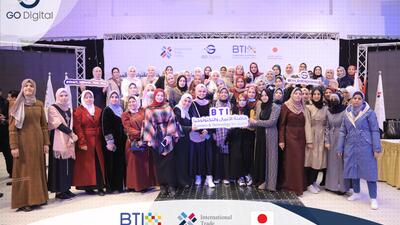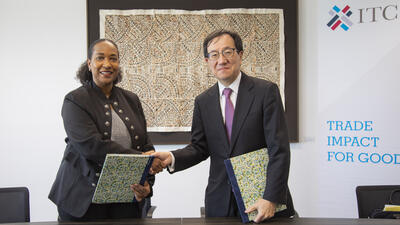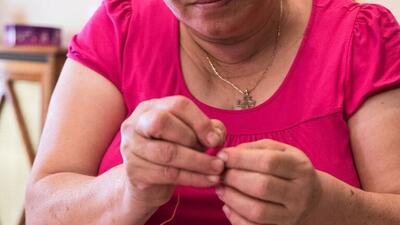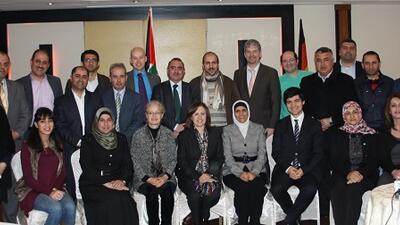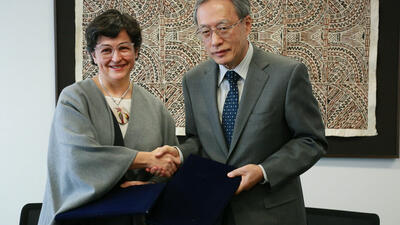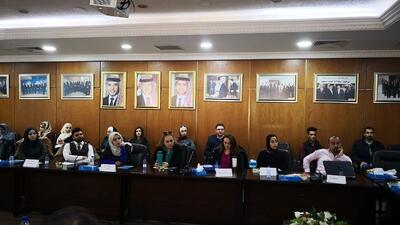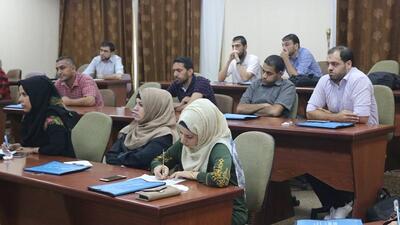
Go Digital e-learning training combines technology with education
This first-of-its-kind project taught 45 young Gazan university graduates how to produce high-quality interactive online courses
While the COVID-19 crisis has taken a toll on the academic progress and mental health of students across the world, it’s also highlighted the importance of using technology properly in education. Indeed, the pandemic inspired the International Trade Centre (ITC) and its Gazan partner to develop an innovative and new component of its Go Digital initiative in Gaza on how to develop e-learning curricula.
The training targets university graduates who studied education – especially English, mathematics or science – but failed to find work in their chosen fields because the number of jobs available for teachers is very limited compared with the number of graduates.
Trainees learn how to convert physical teaching materials into virtual content so they can compete in the fast-growing digital economy and freelance market. Learning to develop online curricula in different topics enables them not only to work at the local level, but also through online marketplaces and globally.
‘The discussion was brought up with the main local counterpart, the Business and Technology Incubator (BTI), on how to turn this idea into a reality,’ said ITC Project Manager Eman Beseiso. ‘It was a collective effort. We built the concept together, then it was implemented for the first time in Gaza.’
Samiha Mahdi, 23, was one of those young graduates who could not find work in Gaza as an English teacher. Her decision to apply for the e-learning course, which showed her how to transform educational curricula and material into an online learning product, changed the path of her life. She is now an instructional designer capable of producing high-quality professional online courses.
‘I learned about a range of programmes that specialize in educational media: sound, video and image,’ Samiha says. ‘In addition, I learned an advanced skill in these programmes. I have created a wide range of creative samples and I created my first online course about gamification.’
She credits Go Digital with helping her land a long-term contract with an educational design company in the United Arab Emirates.
Samiha is one of the 45 Palestinian university graduates – 41 of whom are women – who completed the 4-month course. More than 620 Gazans applied for the training, underscoring the growing appreciation of the value of digital technologies.
Triumphing over the steep learning curve
Mathematics graduate Dalia Abo Audah saw the project as an ‘irreplaceable opportunity’ that enabled her to become self-employed and ‘learn about a new specialty and technical terms I had not heard of before. Within just a few months, I was able to find new skills’.
While Dalia, 23, describes her initial performance as ‘poor’, that changed quickly as the training progressed. Her early efforts to secure work were unsuccessful, despite her outreach to clients and educational designers.
One day, however ‘I was surprised by a response to my e-mail from a client I met through social media requesting an educational designer. I succeeded in competing and getting the job’. And two days later, another client hired her to develop a curriculum. ‘It was a great opportunity for me,’ Dalia says.
The e-learning course has been pivotal for other trainees, too. Collectively, they have generated more than $10,000 in revenue using digital and freelancing platforms. Ten were selected to work with Alison, an Ireland-based global virtual team operating in 27 countries, and four others signed long-term contracts with clients in Saudi Arabia and the United States.
Furthermore, Go Digital beneficiary Mariam Alzenaty developed MariamID, a platform to provide English and Arabic educational services, and several groups of trainees have formed teams and developed their own businesses, establishing three agencies.
‘Through this component, we were able to build capacities for a new group of trainees at the time when unemployment skyrocketed and lack of opportunities and hardships prevailed,’ said BTI head Basel Qandeel. ‘This group is now capable of designing and producing educational materials, selling them on freelancing platforms and making decent profits like any other graduates of different faculties. Hence, we proved that faculties and specialties are not an obstacle.’





